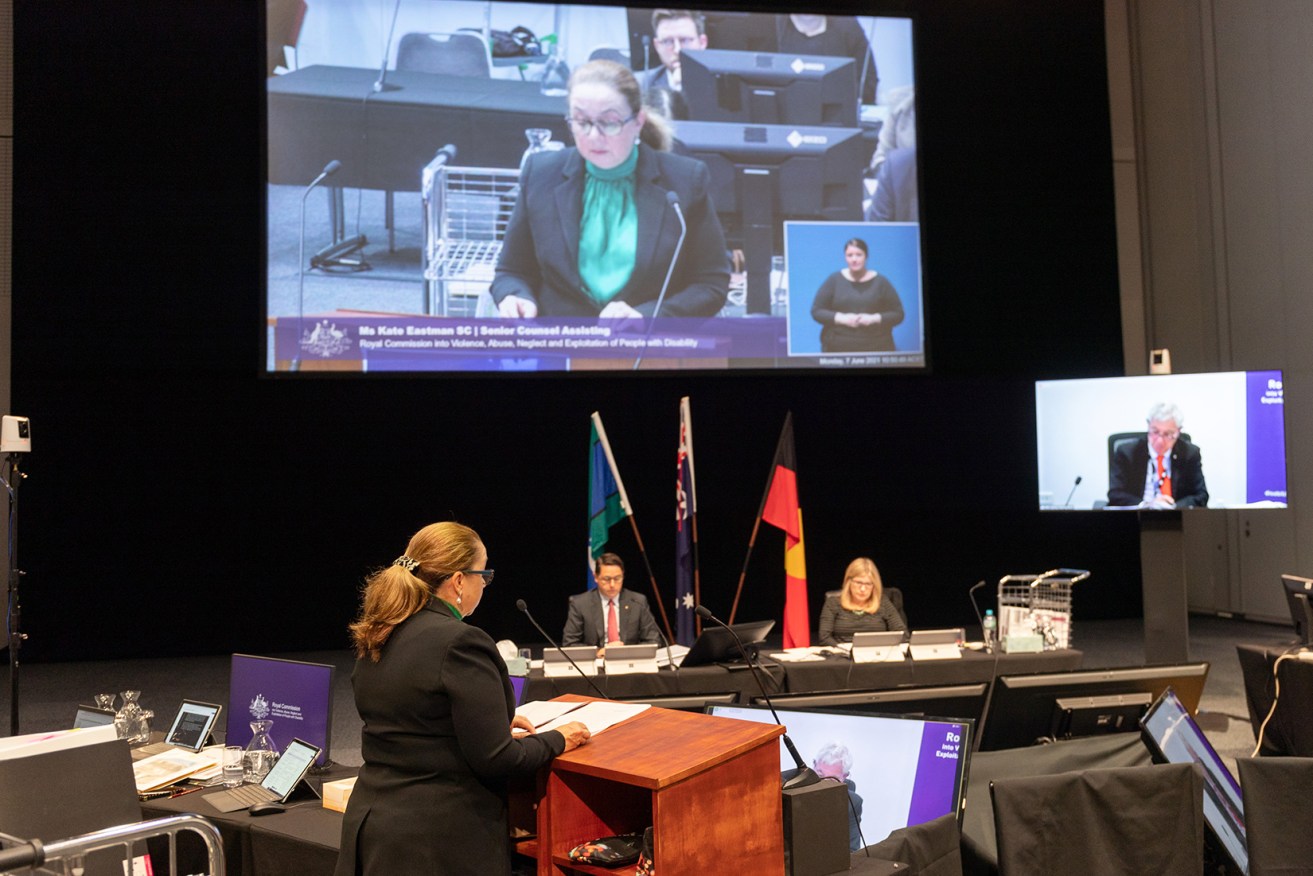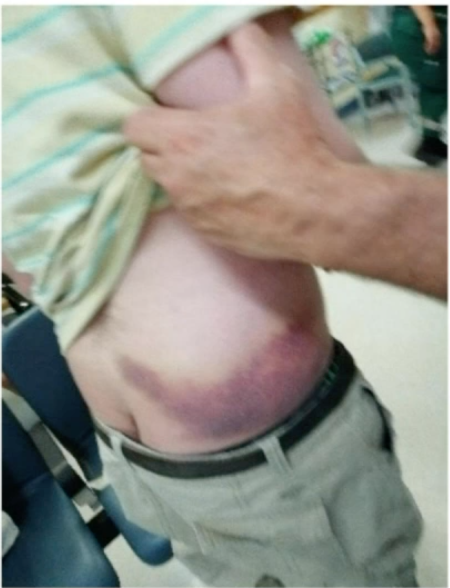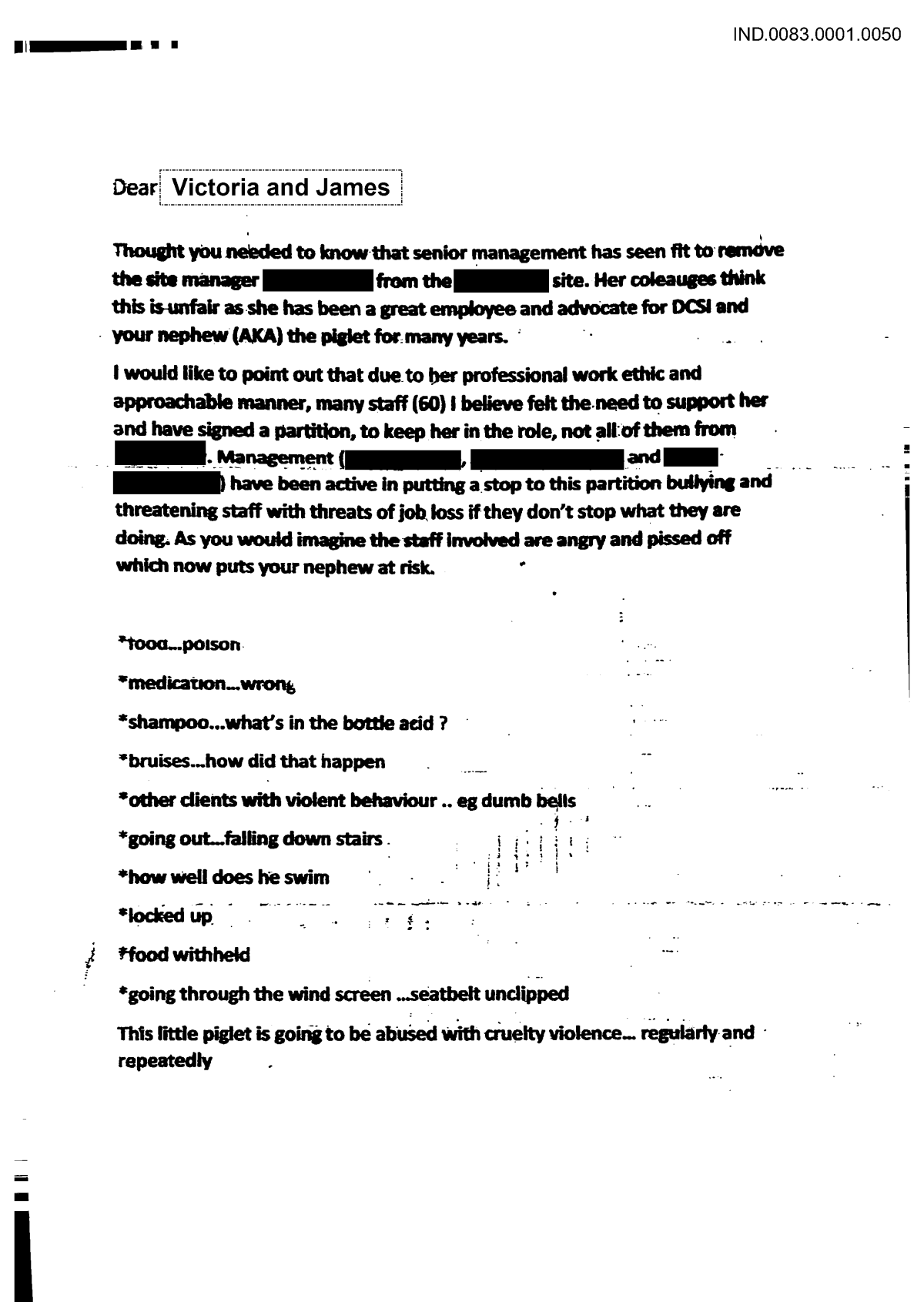Mother left in the dark by DHS over son’s injuries
The South Australian Department of Human Services did not grant the mother of a man with autism access to a report into how he acquired a large unexplained bruise while living in disability care, telling her the investigation was “inconclusive” and she would have to file an FOI request for the details, an inquiry has heard.


Kate Eastman SC speaking at the Disability Royal Commision at the Adelaide Convention Centre (Photo: Tony Lewis/Disability Royal Commission)
The Royal Commission into Violence, Abuse, Neglect and Exploitation of People with Disability heard from disability advocate Karen Rogers on Tuesday at the second day of the inquiry’s week-long public hearing in Adelaide.
Her evidence came after commissioners heard from Victoria* (not her real name) and James on Monday who told the inquiry they were sent an anonymous letter containing threats to “regularly and repeatedly” abuse their nephew in DHS disability care due to staff frustration about the dismissal of a manager.
The DHS was unable to identify the author of the letter and “failed to properly investigate” the matter, according to the South Australian Ombudsman.
Read Victoria and James’s full story below
On Tuesday, the inquiry heard from Karen whose son Daniel, 40, has autism and epilepsy. He lived in a State Government-run disability home on Norman Street from 2005 to 2019.
Karen said she had a “good relationship” with the DHS support workers at the facility and learned how to “pick my battles” and only raise issues about Daniel’s care when she thought it was “absolutely necessary”.
However, she said problems with Daniel’s grooming and hygiene became “acute” from 2017 onwards.
“I noted that Daniel was sometimes dressed in clothes that looked like they didn’t belong to him and at times he smelled often of faeces and very bad breath,” Karen said.
She added that she “didn’t notice any significant improvements” after she raised the issue with accommodation services manager Wayne Cunningham.
In October 2018, Karen noticed a bruise “about the size of a forefinger” on Daniel’s inner arm.
“The bruises I saw on Daniel’s arm concerned me because of the size and proportion, [and] made me think they were caused by someone dragging Daniel’s arm,” she said.
Karen added that she was more concerned about the bruise because it occurred a week after she was “lied to” by care home staff about the purchasing of Daniel’s bed linen.
In February 2019, a local doctor admitted Daniel to hospital to have scans for internal bleeding after he sustained a large bruise on his back.
Karen said she was “horrified” by the extent of the bruising, which stretched “around Daniel’s waist going from his spine to in front of his kidneys”.

Bruising on Daniel’s back (Photo Supplied: Disability Royal Commission)
The inquiry was later told support workers at the facility reported the bruise as “insignificant” in the Department’s incident management system, and this severity rating was not changed despite a subsequent review into the matter.
After Daniel was discharged from hospital, Karen returned him to the disability care home to pick up his medication.
“When we drove into the [care home] driveway, Daniel became distressed, he held on to his seatbelt constantly and repeated saying ‘don’t want it, don’t want it’,” she said.
Karen made a decision to remove Daniel from the home as he seemed “traumatised”.
“He was very unsettled at night and if we mentioned N Street in a conversation, he became very distressed and he would start hitting himself in the head,” she said.
The DHS recommended Karen make a report to the police. SAPOL investigated the matter but were unable to take a statement from Daniel due to his limited speech.
Karen said she was told the Department would also investigate the incident.
“I was not involved in or consulted about the DHS investigation,” Karen said.
“Daniel was living with me after February 2019 and the [Department’s] IMU (Incident Management Unit) never sought to interview him or me.”
The inquiry heard that IMU director Stewart Dodd told Karen more than a year after the bruising occurred that the DHS investigation was “inconclusive” and he was unable to provide a copy of the report.
Karen said Dodd told her if she wanted to see a copy of the investigation she would “need to make a freedom of information application”.
“I didn’t make the application because I felt the process would be too onerous and I just didn’t have the time or the energy to do so,” she said.
Dodd is scheduled to appear before the inquiry on Friday.
Karen said DHS chief executive Lois Boswell apologised to her 15 months after the incident for the Department’s handling of the matter.
Dodd also apologised for not informing Karen when the investigation was complete.
Bruise reported as ‘insignificant’, managers instructed to remove ‘unfounded allegations’ from incident reports
Accommodation services manager Wayne Cunningham said he could not explain why staff initially reported Daniel’s bruise as “insignificant”, with the commission later hearing this categorisation delayed senior DHS executives being notified of the incident.
“I would have categorised it as a major [injury],” he told the inquiry.
“I can’t explain why that staff member at the time did not report it appropriately.”
However, he rejected suggestions from the commissioners that the incident was “deliberately downplayed” by staff at the care home.
“Nothing that came out of the investigation indicated that. I think it was just the bruise came out at different times – it started off very small and seemed to have grown,” Cunningham said.
“I think staff reported it as they saw it.”
He said support workers at the facility believed the bruising happened outside the home but “no one could come to a determination”.
“Staff were questioned at length, every staff member involved was interviewed by myself and HR, and staff were made to undertake the code of ethics training after the interview,” he said.
The commissioners later heard from DHS director of accommodation services Muriel Kirkby, who said staff reporting of the incident was “completely inadequate for the size and the scale of what was happening with Daniel’s bruising”.
Under cross-examination from Elizabeth Bennett, the counsel assisting the Royal Commission, Kirkby said she was not aware of any “specific formal training for the support officers” regarding incident reporting.
Bennett asked Kirkby whether “inaccurate reporting by the initial reporter can infect and affect the way that that incident is treated in the future”.
“That is fair,” Kirkby responded, noting there are “trigger words” within the reporting system which push the incident up the chain of command.
Kirkby said she was not notified of Daniel’s hospital visit on Friday until Karen told her the following Monday, as the DHS had “a number of poor reporting practices in the week leading up to” the incident.
“Absolutely [the poor reporting] affected the investigation, and it also affected our transparency and trust and all of those sorts of things with the family,” she said.
“So when Karen rang me and sent me the photographs of the bruising … I was completely horrified that I was hearing this from a Mum, as opposed to internally.”
The counsel assisting also highlighted to Kirkby an instruction contained within a DHS incident reporting manual that told accommodation managers to “remove any inappropriate statements or unfounded allegations as organisational policy may dictate”.
Bennett told the commission the instruction “appears on its face to be a direction to remove allegations prior to investigation”.
“I don’t quite understand how that removal could take place before an investigation,” Bennett said, to which Kirkby agreed but said she would have to take the matter on notice.
The DHS executive went on to say she was “absolutely horrified” by the conditions she saw at the Norman Street home Daniel was living in, agreeing with the commissioner’s characterisation it had an “air of neglect”.
“When you open the front door and you’re met with a smell of urine, does nobody ask a question about that? What does that say about what’s going on in that house?” Kirkby said.
She added she was disappointed to hear Daniel’s mother felt unable to raise all her concerns with support staff at the facility.
“I don’t want to hear that families are feeling that they need to choose their battles… what does that say about our culture and what do we need to do about it?”
DHS failed to investigate threats made against disability resident
The DHS also “failed to properly investigate” an anonymous letter which contained threats to poison, wrongly medicate, withhold food and “regularly and repeatedly” abuse a person with an intellectual disability living in state care, the inquiry was told earlier in the week.
Kate Eastman QC, the counsel assisting, laid out the case of Mitchell, 38, who has autism and has been diagnosed with anxiety, bipolar disorder and post-traumatic stress disorder.
Eastman told the inquiry Mitchell had been living in a DHS-run group home since 2017 and his guardians, Victoria* and James, had concerns about his care “within the first few months” of his stay.
“In 2017, Victoria raised some of her concerns, and her perception based on the way in which her concerns were responded to was that she felt she might be targeted in relation to allegations made about her and they may have been designed to discredit her reputation,” Eastman said.
Victoria and James, who are Mitchell’s aunt and uncle, managed to organise fortnightly meetings with workers in the group home after raising their concerns.
The accommodation service manager at Mitchell’s residence was removed from her post in February 2018.
A month later, Victoria and James received an anonymous letter threatening retribution on their nephew for the manager’s dismissal.
“Her colleagues think [her dismissal] is unfair as she has been a great employee and advocate for DCSI [now the DHS] and your nephew (AKA) the piglet for many years,” the letter reads.
“As you would imagine the staff involved are angry and pissed off which now puts your nephew at risk.
“Food…poison, medication…wrong, shampoo…what’s in the bottle acid?
“Other clients with violent behaviour…eg dumb bells, going out…falling down stairs, how well does he swim, locked up, food withheld, going through the wind screen…seatbelt unclipped.
“This little piglet is going to be abused with cruelty violence…regularly and repeatedly.”

The anonymous letter sent to Mitchell’s guardians (Supplied: Disability Royal Commission).
Victoria and James made a report to police and contacted the DHS after receiving the unsigned letter, and later made a complaint to the South Australian Ombudsman and the NDIS Quality and Safeguards Commission.
The police did not investigate the threats and left the matter for the DHS to investigate.
Despite Victoria and James believing the DHS was investigating the letter, they asked then Principal Community Visitor Maurice Corcoran to follow up the matter with the Department.
Corcoran informed the guardians the incident was not being followed up by the Department – seven months after the letter was sent.
“I have met with Trevor [that is a relevant officer in the department] and have confirmed that his unit did not investigate nor interview staff regarding the threatening letter,” Corcoran’s said in an email to Victoria and James.
“So I remain concerned that this was never properly investigated by either the police or the FAIR team.”
In a report dated January 27, 2021, the Ombudsman found the DHS “failed to properly investigate the letter” and its failure was “unreasonable”.
The Ombudsman recommended the DHS apologise to Mitchell’s guardians and reopen the inquiry to identify the author of the letter.
The DHS’s second investigation, spanning from January to February 2021, took statements from eight staff members but was still unable to identify the author of the letter.
James said the Department did not interview key support workers at Mitchell’s group home until three years after the letter was sent.
“There were some people who were core members of Mitchell’s team, including the area manager, who were not interviewed until 2021,” he told the inquiry.
“So three years after the event, some key people who would have been present and fully around the area at that time and aware of the residents … were not interviewed at that time.”
James accused the DHS of not taking accountability for the incident and their subsequent investigation.
“Any CEO or director who can look at that letter and think it’s okay for a worker or group of workers to refer to one of their clients as ‘piglet’ and think that that’s okay, and think that that’s a culture that they can tolerate, I don’t think they should be in the positions they’re in,” James said.
DHS chief executive Lois Boswell sent a written apology to Mitchell’s parents on March 11.
Boswell and the Department’s internal audit manager Tony Allwood will appear before the commission later this week.
DHS director of accommodation services Muriel Kirkby on Tuesday told the inquiry that Mitchell’s story was “heartbreaking” and it was “really hard to watch” Victoria and James’s pain while giving evidence.
“It’s completely heartbreaking to even think that anyone would write such a letter about anyone, particularly about a vulnerable person,” she said.
“The thought as the director of a service that there’s potential that one of my staff could have written that absolutely sends shivers down my spine.”
The inquiry continues.




